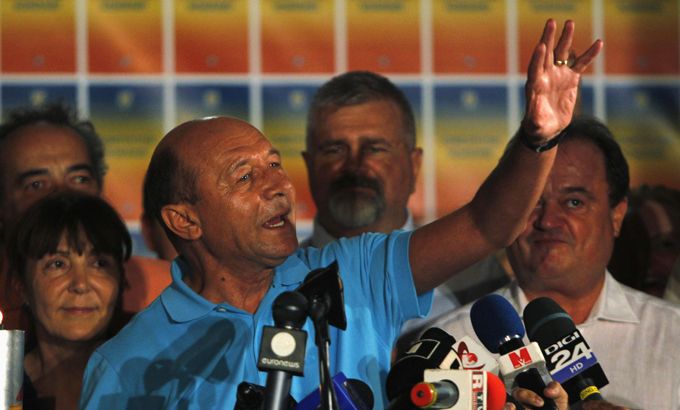Romanian leader survives referendum
Traian Basescu survives an impeachment vote, as the turnout falls below the required 50 per cent.

Romanian President Traian Basescu has survived an impeachment vote due to low turnout, according to figures released by the polling panel.
The central electoral bureau said the figures showed that turnout stood at 45.92 per cent, short of the 50 per cent threshold needed for the result to be validated by the constitutional court.
|
“Romanians have decided their fate by invalidating the referendum“ – Traian Basescu, Romanian president |
Monday’s announcement came just hours after the suspended leader claimed that voters had “rejected a coup” by not turning out in high enough numbers to validate an impeachment vote.
Polling closed at 20:00 GMT on Sunday, more than half of the electorate needed to cast a ballot for the vote result to stand.
Basescu told supporters on Sunday evening that the low turnout was a sign that “the democracy flame is still ablaze”.
An exit poll carried out by private television station Realitatea TV showed a majority of voters – 86.9 per cent – voting to impeach the president.
“Romanians have rejected the coup staged by the 256 lawmakers led by [Prime Minister] Victor Ponta and [interim president] Crin Antonescu,” Basescu said from his campaign headquarters minutes after polling closed.
“Romanians have decided their fate by invalidating the referendum,” he said.
The first official results were published at 07:00 GMT on Monday.
Romanians were voting on whether to oust Basescu, the culmination of weeks of political feuding that has cast doubt over the democratic credentials of the European Union’s newest member.
‘Low turnout’
Antonescu pledged the constitution would be respected.
“We will be guided by the respect of all relevant institutions, whether it be the electoral bureau or the constitutional court,” he said shortly after polling ended.
Ponta stopped short of conceding the turnout would fall short of the required 50 per cent mark but warned that Basescu could not ignore the will of millions of voters, even if he managed to cling to his job.
Polling stations opened at 04:00 GMT on Sunday. Around 18.3 million people were eligible to vote, including large diasporas in Spain and Italy.
The opening hours had been extended and a number of additional polling stations had been set up along the Black Sea coast to facilitate voting for holidaymakers and rural populations in a country where voter fatigue is high.
Basescu was once one of the country’s most popular politicians whose ratings plummeted amid austerity cuts in 2010.
| Romania’s president faced impeachment vote |
Romania has been gripped by a bitter conflict between the conservative president and the Social-Liberal Union (USL) of Prime Minister Ponta, which took power in May and quickly moved to oust Basescu.
“Go vote, impeach him”, read banners put up around Bucharest ahead of the vote by the USL, which has appealed for high voter turnout.
“We must not forget that we cannot install solid and lasting democracy without the votes of as many people as possible,” said interim president Crin Antonescu on Friday.
Basescu and opposition Liberal Democrats have meanwhile called on voters to boycott a referendum they say would “legitimise a coup”. They claim the ruling coalition plans to rig the vote.
Basescu said last week that he was willing “to govern with the current majority to ensure the country’s stability”.
The referendum comes after weeks of contentious moves by the government to manipulate Romania’s political institutions, which led to sharp warnings from Brussels and the United States that democracy was being eroded.
Ponta’s government removed opposition parliamentary speakers, sacked an ombudsman and clipped the powers of the constitutional court.
The European Commission said the dramas “raise serious doubts” about Romania’s understanding of the rule of law but nevertheless praised efforts to fight graft by the anti-corruption prosecutor’s office and other institutions.
Last week analysts said civil society groups had been forgotten in the political fray and needed to be involved to help get the derailed political process back on track.